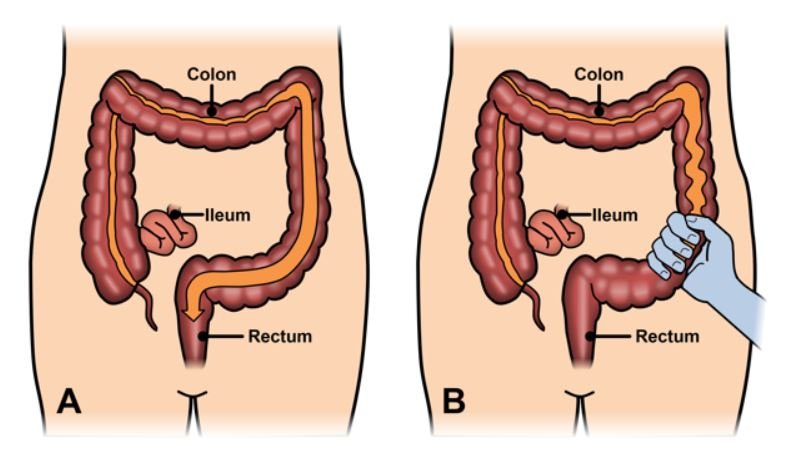

Irritable Bowel Syndrome (IBS) affects mostly women. According to research, there are twice as many women with it compared to men. This may be because of sex hormones.
IBS is a digestive disorder that affects large intestines. This leads to symptoms of bloating, abdominal pain, stomach cramps, constipation and bowel movement changes. It’s a lifelong disease that can be frustrating since symptoms come and go over time. They can last for days, weeks or months every time. There is no known cure for it but medicine and diet changes can control the symptoms.

Irritable bowel syndrome
There is no certain test or mark to show that one has IBS, but the diagnosis is based on symptoms. It is based on symptom patterns which fit established criteria together with a physical exam. Tests to rule out conditions that have similar symptoms are also performed.
Doctors use the Rome Criteria, a symptom checklist to diagnose IBS. The affected has to have had recurrent abdominal pain that is usually associated with two or more of these symptoms for at least 3 months:
Some people may have all the symptoms that meet the Rome Criteria yet they do not have IBS. This, therefore, means that one cannot diagnose themselves. You need to see a doctor.
They are not known but IBS has been linked to having oversensitive nerves in the gut, food passing too quickly or slow during digestion, family history, and stress.
The large intestine or colon’s primary function is the absorption of salts and water derived from the digestive materials entering from the small intestine. During the process, two quarts of liquid matter enter the colon on a daily basis. It remains there for days until most of the salts and fluids are absorbed. Whatever is left over (the stool) uses a pattern of movements to pass through the colon. It’s then stored here until bowel movements occur. The movements of the colon push these contents in a back and forth motion towards the rectum. Strong muscle contractions happen few times in the day that helps moves the contents down the colon. This results in a bowel movement.
An abnormality is present in people who have IBS during this muscular action. Their colon is reactive and more sensitive than usual. Normal events like eating and distension of gas can cause their colon to overreact. Taking certain medications or eating certain foods like milk products, high-fat foods, chocolate or alcohol in large amounts may also trigger attacks. Drinking caffeine also causes loose stools (this happens to people without the condition too) and can be quite problematic.
Some women report that their symptoms appeared after they had suffered a bacterial infection like gastroenteritis. There is, therefore, increasing evidence as to the fact that infection and inflammation play a role in the IBS symptoms.
In other cases, IBS is associated with anxiety and depression and some research indicates that it affects people who experienced trauma early in life. However, the symptoms are real and have a physiological basis. While stress aggravates these symptoms, other reasons like nerve sensitivity in the colon and colon motility play a huge role.
The good news from all this is that though it’s irritable and causes discomfort, IBS does not permanently harm the intestines. It does not also cause intestinal bleeding, cancer or inflammatory bowel diseases (ulcerative colitis or Crohn’s disease).
IBS does not also affect one all the time. You can have months with no symptoms although sometimes you can experience daily symptoms. Although it’s chronic, a third of the people who have suffered it no longer have it after several years.
The main symptoms of IBS in women include:
You get worse and better days with the symptoms and this can be triggered by drinks or foods you eat. Some women suffer constipation, others suffer diarrhea while others have bouts of both.
Other symptoms include:
See the doctor if you notice any of these symptoms because they could indicate a more serious condition:
These symptoms of IBS in women cause more than physical distress. They can make women suffer from depression, stress, frustration, and anxiety. This is because IBS is embarrassing and hard to talk about. Anxiety s brought on by the fact that one wants to stay near a toilet in case you develop the urge to go. For those with symptoms that range from moderate to severe (this can include urgency, unpredictable pain, or bowel incontinence) IBS can affect how they work, travel, attend social events or relate with their family, sexual partners and friends.
IBS symptoms are a good example of the “mind-gut” connection according to researchers. This means that when one has IBS, they get stressed and this stress triggers more symptoms. The nervous system partly controls the and when parts of the brain area that are stress influenced get overwhelmed, they affect the gastrointestinal tract. Pain and other symptoms will follow leading to more anxiety.
There is no one medication fits all for IBS but there are lots of things one can do to help with the symptoms. Treatment will depend on the symptoms you have. It will involve a change in lifestyle, psychological treatment, and pharmacological treatment.
Cognitive-behavioral treatment of irritable bowel syndrome aims at helping women to overcome their health issues through changing their way of thinking, emotional response and behavioral response. Women suffering from IBS share their experiences on living with IBS and find support in other women dealing with the same. It helps them change their negative thoughts, feelings, and behavior, it also helps them deal with the social stigma and shame IBS symptoms cause. The goal is for a woman to find effective ways of coping with the condition, reduce symptoms and improve their lives.
References